Premium Only Content
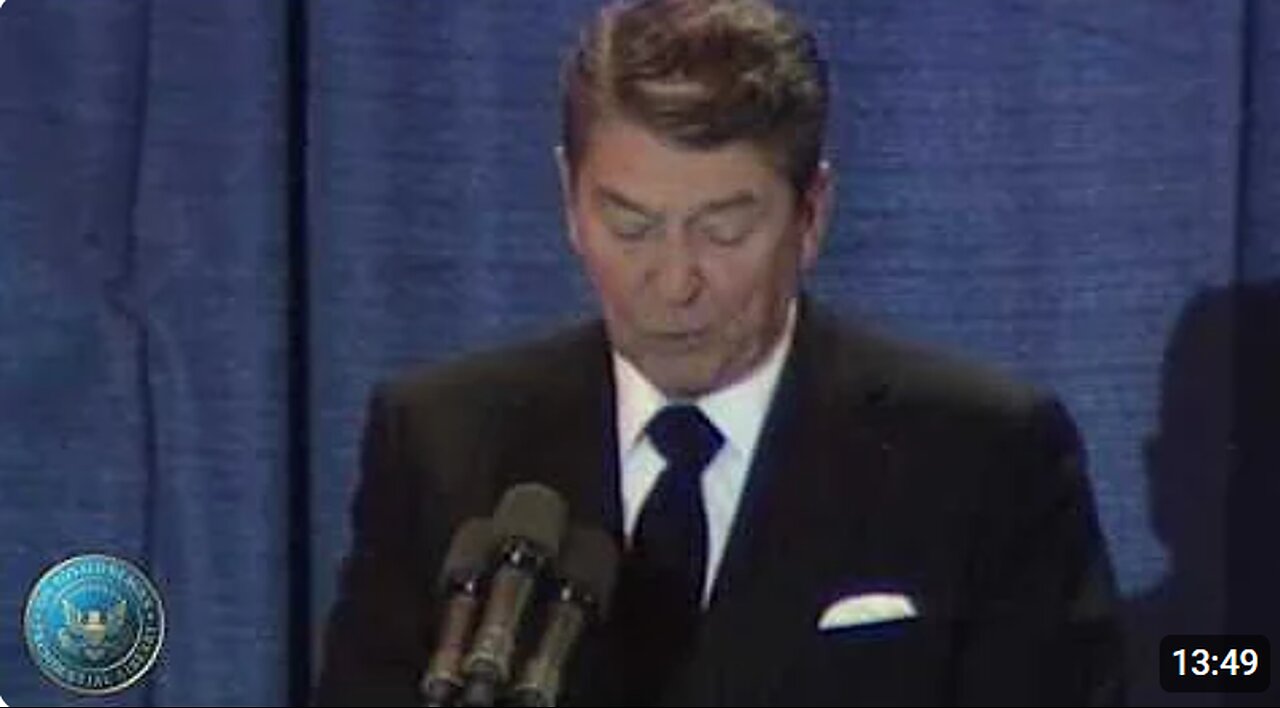
President Reagan's Remarks at a Memorial Service for Crew members of the USS Stark in Jacksonville
Remarks at a Memorial Service for Crewmembers of the U.S.S. Stark in Jacksonville, Florida
May 22, 1987
[USS Stark (FFG-31) was a guided-missile frigate of the Oliver Hazard Perry class12. It was named after Admiral Harold Rainsford Stark1. It was ordered in 1978, launched in 1980, and commissioned in 19821. It was struck by two Iraqi Exocet missiles in the Persian Gulf on May 17, 1987.]
Our task today is simple and sad: to remember, to pay tribute to those we loved. For some of us here today, our love is the unquenchable, unforgetting love of a wife or child for a fallen father, of a mother or father for a fallen son. For others of us, this love, while more distant, is still anguished and grieving; ours is a love for a fallen countryman who died so that we, a free people, might live and this great nation endure.
Even as we hear these words, we understand again their inadequacy. We appreciate anew Lincoln's humble wisdom at Gettysburg. When brave men die, it is their deeds, not our words, that are remembered. It is their sacrifice, not our brief recollection, that offers everlasting testimony to their love for others, and their love for us. But we're human, and today we know such great heartache. So, we come to this place to seek the simple assurance of each other and the hope of finding a higher meaning, a greater purpose. And so we ask: Why did this happen? Why to them? Could anything be worth such a sacrifice? And these fallen, whom we knew and loved but rarely thought of as great men or legends, can we now truly say they are heroes? And even if we can, would we not rather have them back, ordinary men again perhaps, but still ours, ours to hold and to keep?
The answers are hard. Hard because memory forces some of us to remember other faraway places which Americans had never heard of until their sons and brothers and fathers and friends fell there. Each Memorial Day, and especially with the news of the past week, my own mind has turned many times to the great war of 46 years ago. Few of us who lived through it can ever forget those opening months of conflict, when our nation and our fighting men were so sorely tested.
In later years, in the South Pacific campaign, American sailors would speak often of the bravery of the marines they put on the beaches to fight and die; but one night, especially, off a place called Guadalcanal, as the shellfire lit the darkness in one of the most violent surface actions ever seen, it was the marines who stood in awe and in silent tribute to the men of the United States Navy. Hopelessly outnumbered and outgunned, a small group of U.S. ships had taken on a powerful enemy fleet. And though five Medals of Honor were won and the enemy was turned back and Guadalcanal was saved, the price was so high and the burden so heavy -- nine ships and hundreds of young lives. And none of us who were alive then can forget the special burden of grief borne by Mr. and Mrs. Thomas Sullivan of Waterloo, Iowa. They would remember forever the autumn afternoon they learned that their sons -- George, Francis, Joseph, Madison, and Albert -- the Five Sullivans as we knew them then, would not be coming home.
But while our sorrow was great in those days, I cannot help but tell you this morning that in some ways it was easier to bear then, because it was easier to understand why we were there and why we were fighting. The burden of our own time is so different. And when young Americans like those of the U.S.S. Stark die in far-off seas, we learn again how right President Kennedy was when he spoke of the sacrifices asked by a ``hard and bitter peace'' and our own ``long twilight struggle.'' Even at moments like these, then, we must address directly the reason the U.S.S. Stark and her men were there in the Persian Gulf. You're entitled to know the importance of the role that their valor played in keeping our world safe for peace and freedom.
There's a reason why, since 1949, American ships have patrolled the Gulf. Every American President since World War II has understood the strategic importance of this region: It is a region that is a crossroads for three continents and the starting place for the oil that is the lifeblood of much of the world economy, especially those of our allies in Europe. Even more important, this is a region critical to avoiding larger conflict in the tinderbox that is the Middle East, and our role there is essential to building the conditions for peace in that troubled, dangerous part of the world. And it is this objective that has guided us as we've sought to end the brutal war between Iran and Iraq, a war that has gone on for over 6\1/2\ terrible years and taken such an awful toll on human life.
Peace is at stake here, and so too is our own nation's security and our freedom. Were a hostile power ever to dominate this strategic region and its resources, it would become a chokepoint for freedom -- that of our allies and our own. And that's why we maintain a naval presence there. Our aim is to prevent, not to provoke, wider conflict, to save the many lives that further conflict would cost us.
The fallen sailors of the U.S.S. Stark understood their obligations; they knew the importance of their job. So, too, I believe that most Americans today know the price of freedom in this uneasy world. They know that to retreat or withdraw would only repeat the improvident mistakes of the past and hand final victory to those who seek war, who make war, who know it would only invite further aggression and tragedy. So, it's a simple truth we reaffirm here today: Young Americans of the U.S.S. Stark gave up their lives so that the terrible moments of the past would not be repeated, so that wider war and greater conflict could be avoided, so that thousands, and perhaps millions, of others might be spared the final sacrifice these men so willingly made.
So, we ask again: Were they heroes? ``Heroes are not supermen,'' Herman Wouk once reminded us, ``they're good men, and embodied by the cast of destiny, the virtue of a whole people in a great hour.'' And writing of the thousands of such heroes in our nation, men and women who wear our country's uniform in this troubled peace of ours, he asked us to never forget ``to reassure them that their hard, long training is needed, that love of country is noble, that self-sacrifice is rewarding, that to be ready to fight for freedom fills a man with a sense of worth like nothing else.'' And he said, ``If America is still the great beacon in dense gloom, the promise to hundreds of millions of the oppressed that liberty exists, that it is the shining future, that they can throw off their tyrants, and learn freedom and cease learning war, then we still'' need heroes ``to stand guard in the night.''
The men of the U.S.S. Stark stood guard in the night. One of our Ambassadors paid them this tribute: ``They were tough, they were brave, they were great.'' Well, they were great, and those that died did embody the best of us. Yes, they were ordinary men who did extraordinary things. Yes, they were heroes. And because they were heroes, let us not forget this: that for all the lovely spring and summer days we will never share with them again, for every Thanksgiving and Christmas that will seem empty without them, there will be other moments, too, moments when we see the light of discovery in young eyes, eyes that see for the first time the world around them and know the sweep of history and wonder, "Why is there such a place as America, and how is it that such a precious gift is mine?'' And we can answer them. We can answer them by telling of this day and those that we come to honor here. And it's then we'll see understanding in those young eyes; it is then they will know the same gratitude and pride that we share today, the gratitude and pride Americans feel always for those who suffer and die so that the precious gift of America might always be ours.
The men of the U.S.S. Stark have protected us; they have done their duty. Now let us do ours. Senior Chief Gary Clinefelter showed us how yesterday. He had volunteered to work at the coordinating center here for the families when he received word that his own son, Seaman Brian Clinefelter, previously listed as missing in action, was among the confirmed dead. ``I need to keep working,'' he said. He stayed at his post; he carried on. Well, so, too, we must carry on. We must stay at our post. We must keep faith with their sacrifice. In our great hour, we must answer, as did they, the call of history. It's a summons that, as a nation or a people, we did not seek, but it is a call we cannot shirk or refuse -- a call to wage war against war, to stand for freedom until freedom can stand alone, to live for liberty until liberty is the blessing and birthright of every man, woman, and child on this Earth.
And let us remember a final duty: to understand that these men made themselves immortal by dying for something immortal, that theirs is the best to be asked of any life -- a sharing of the human heart, a sharing in the infinite. In giving themselves for others, they made themselves special, not just to us but to their God. ``Greater love than this has no man than to lay down his life for his friends.'' And because God is love, we know He was there with them when they died and that He is with them still. We know they live again, not just in our hearts but in His arms. And we know they've gone before to prepare a way for us. So, today we remember them in sorrow and in love. We say goodbye. And as we submit to the will of Him who made us, we pray together the words of scripture: ``Lord, now let thy servants go in peace, Thy word has been fulfilled.''
May I point out again, so many of you have known long months of separation from your loved ones, from those young men. You were separated by distance, by miles of land and ocean. Now you are separated again, not just by territorial limits but because they have stepped through that door that God has promised all of us. They do live now in a world where there is no sorrow, no pain. And they await us, and we shall all be together again.
God bless you.
Note: The President spoke at 11:57 a.m. at the Mayport Naval Station. Following the memorial service, he met with the families of the crewmembers who lost their lives in the missile attack. The President then traveled to Camp David, MD.
-
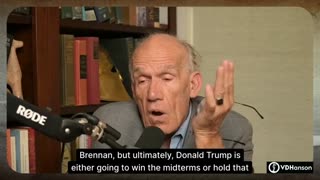 1:03:23
1:03:23
Joseph Wouk's Channel
24 days agoThe Vietnam War, More Trade Deals, and Hulk Hogan, RIP
84 -
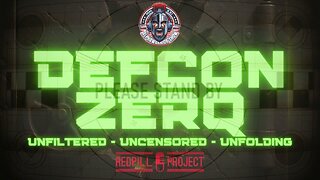 2:19:32
2:19:32
Badlands Media
1 day agoDEFCON ZERO Ep. 005: False Flags, Cyber Fronts & Global Power Plays
134K50 -
 2:35:23
2:35:23
FreshandFit
6 hours agoWhy Black Men Don't Date Black Women Debate
26.5K27 -
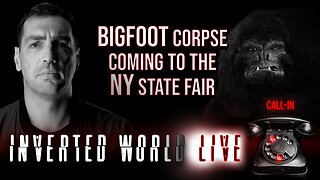 2:03:42
2:03:42
Inverted World Live
10 hours agoBigfoot Corpse Coming to the NY State Fair | Ep. 94
100K24 -
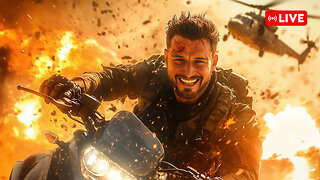 6:16:23
6:16:23
SpartakusLIVE
10 hours ago$1,000 Pistol Challenge || #1 ENTERTAINER of The EONS Eradicates BOREDOM
75.6K2 -
 2:33:37
2:33:37
TimcastIRL
8 hours agoTrump Orders Review of Smithsonian For Being Woke & Out of Control | Timcast IRL
177K66 -
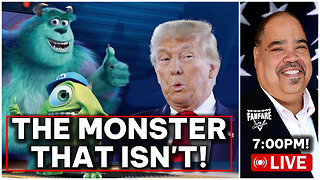 3:09:10
3:09:10
Barry Cunningham
11 hours agoPRESIDENT TRUMP HAS TAKEN THE MONSTER AWAY FROM THE LEFT! HORROR STORIES WON'T WORK ANYMORE!
78.9K79 -
 1:29:55
1:29:55
WickedVirtue
6 hours agoLate Night Fortnite w/ Friends
48.8K -
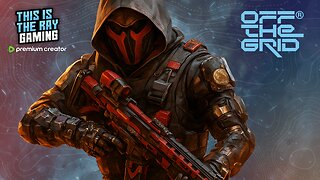 3:34:06
3:34:06
This is the Ray Gaming
6 hours ago $0.79 earnedCould you be? Would you be? Won't you be my RAYBOR? | Rumble Premium Creator
29.4K -
 1:46:52
1:46:52
JahBlessGames
7 hours ago🎉Come een' and come tru' - VIBES | MUSIC | GAMES
50.9K2